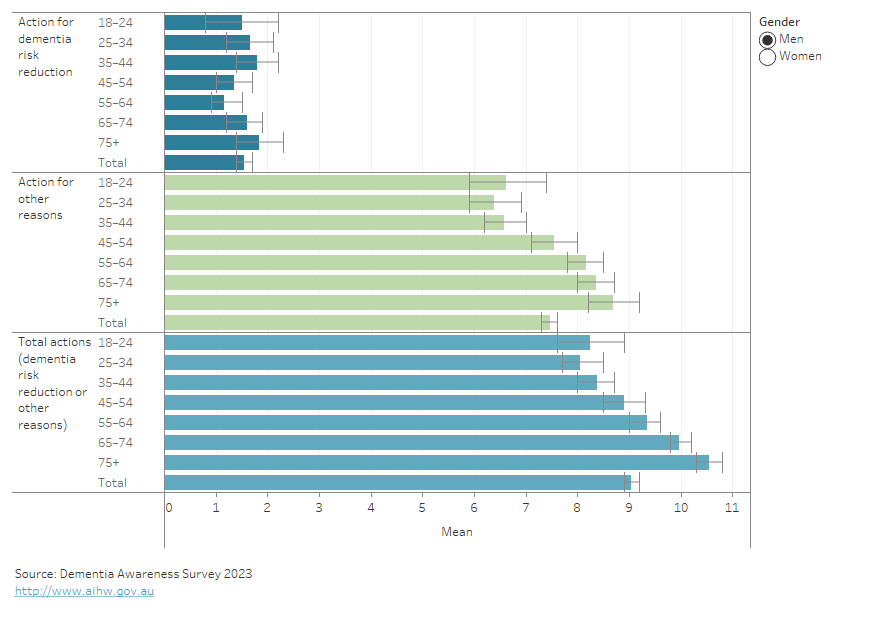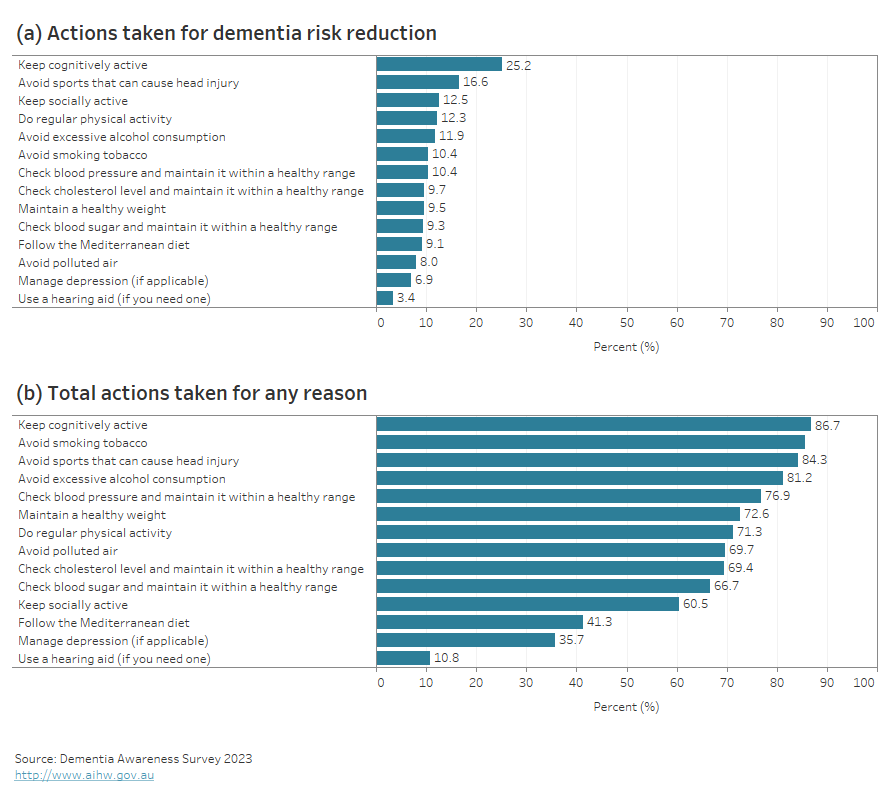Reducing the risk of dementia
-
Almost all Australians (99.6%) are engaged in one or more actions or behaviours that can reduce their risk of developing dementia
-
Australians were 5 times more likely to take actions for ‘other reasons’ than for ‘dementia risk reduction’
-
People who know more about dementia tend to take more actions to reduce risk
What are the risk factors for dementia?
Several factors may increase or decrease a person’s risk of developing dementia – these are called risk factors and protective factors, respectively. Some risk factors, such as ageing and genetics, cannot be changed, but others can be modified by changing behaviours or lifestyles. Current evidence indicates that about 40% of the risk can be reduced by avoiding or changing certain behaviours or lifestyles, such as maintaining healthy blood pressure levels, not smoking, and social engagement (Livingston et al. 2017; AIHW 2023). For more information, see What puts someone at risk of developing dementia?.
Taking steps to minimise exposure to dementia risk factors (such as reducing alcohol consumption and managing existing health conditions) and increasing protective factors (such as engaging in physical and social activities) is the best way to reduce the prevalence of dementia until there is a cure or significant advancements in treatments (Livingston et al. 2017; WHO 2019). However, people often do not know what they can do to reduce their risk of developing dementia or delay the onset of dementia (Mansfield et al. 2023).
Are Australians taking action to reduce their risk of developing dementia?
Australians were asked if they were engaged in 14 actions or behaviours that can reduce their risk of developing dementia and if they were doing these for dementia risk reduction or other reasons.
Many Australians are engaging in these behaviours even though they may not be doing so specifically for dementia prevention. Almost all Australians (99.6%) undertook one or more actions/behaviours that can reduce the risk of developing dementia but less than 2 in 5 Australians were undertaking one or more actions/behaviours specifically to reduce their risk of developing dementia. This may be because people do not know these actions can reduce their risk of developing dementia. Older Australians tended to take more actions/behaviours that can potentially reduce their risk of developing dementia compared to younger Australians, and older women (65 and over) were generally more likely to undertake these actions to reduce dementia risk than younger women (Figure 3.1).
Figure 3.1: Average number of actions taken for dementia risk reduction and for other reasons, by gender and age group, 2023
The bar chart shows respondents, on average, performed 1.5 out of 14 actions to reduce dementia risk compared to 7.5 actions for other reasons.

What actions do people take?
Keeping cognitively active was the main action that people took specifically to reduce the risk of dementia (25%). This was followed by avoiding sports that can cause head injury (17%) and being socially (13%) and physically active (12%). On the other hand, fewer than 10% of Australians followed the Mediterranean diet, maintained a healthy weight, or checked their blood sugar and cholesterol levels and maintained it within a normal range.
The main preventative health actions/behaviours Australians take (for any reason) include keeping cognitively active (87%) and avoiding smoking tobacco (86%), sports that can cause head injury (84%), and excessive alcohol consumption (81%). Undertaking these actions should continue to be encouraged even though people are not undertaking them for dementia risk reduction as they can reduce the risk of developing dementia.
Hearing loss (not corrected with hearing aid use) and depression (not managing depression) are estimated to be responsible for 8% and 4%, respectively, of the risk of developing dementia (Livingston et al. 2020), yet actions to prevent these risks to reduce dementia were low (3.4% and 6.9%, respectively; Figure 3.2). This indicates that despite robust evidence around dementia risk reduction, this is not translating to actions for dementia risk reduction.
Figure 3.2: Number and percentage of preventative health actions taken for (a) dementia risk reduction and for (b) any reason, 2023
The bar chart compares the percentage of people taking actions for dementia (3.4% to 25%) with the percentages of people taking actions for various other reasons (11% to 87%).

Does better knowledge of dementia lead to action?
Australians who knew more about dementia tended to take more actions that can reduce their dementia risk. This was demonstrated by a small (Pearson correlation coefficients less than 0.3) to medium (Pearson correlation coefficients between 0.3 and 0.49) association between the number of actions and both general dementia knowledge (p<0.0001) and knowledge of dementia risks (p < 0.0001; refer to Table S3).
Just over half of Australians (53%) felt that information about reducing their dementia risk was easily available (refer to Table S4).
Four in 5 Australians (83%) agreed that they would be more likely to adopt lifestyle changes if they knew it may help them reduce their risk of dementia (refer to Table S4).
AIHW (Australian Institute of Health and Welfare) (2023) Dementia in Australia: summary, AIHW, Australian Government, accessed 10 January 2024.
Livingston G, Sommerlad A, Orgeta V, Costafreda SG, Huntley J, Ames D, Ballard C, Banerjee S, Burns A, Cohen-Mansfield J, Cooper C, Fox N, Gitlin LN, Howard R, Kales HC, Larson EB, Ritchie K, Rockwood K, Sampson EL, Samus Q, Schneider LS, Selbæk G, Teri L and Mukadam N (2017) ‘Dementia prevention, intervention, and care’, The Lancet, 390(10113):2673–2734, doi:10.1016?S0140-6736(17)31363-6.
Livingston G, Huntley J, Sommerlad A, Ames D, Ballard C, Banerjee S, Brayne C, Burns A, Cohen-Mansfield J, Cooper C, Costafreda SG, Dias A, Fox N, Gitlin LN, Howard R, Kales HC, Kivimäki M, Larson EB, Ogunniyi A, Orgeta V, Ritchie K, Rockwood K, Sampson EL, Samus Q, Schneider LS, Selbæk G, Teri L and Mukadam N (2020) ‘Dementia prevention, intervention, and care: 2020 report of the Lancet Commission’, The Lancet, 396(10248):413–446, doi:10.1016/S0140-6736(20)30367-6.
Mansfield E, Watson R, Carey M and Sanson-Fisher R (2023) ‘Perceptions of community members in Australia about the risk factors, symptoms and impacts of dementia: a cross–sectional questionnaire study’, Australasian Journal on Ageing, 42(1):140–148, doi:10.1111/ajag.13109.
WHO (World Health Organization) (2019) Risk reduction of cognitive decline and dementia: WHO guidelines, WHO, accessed 10 January 2024.


